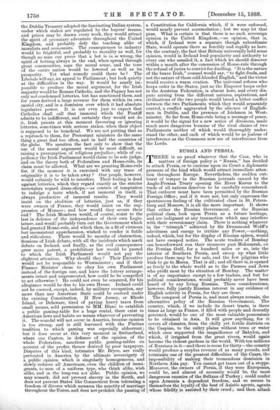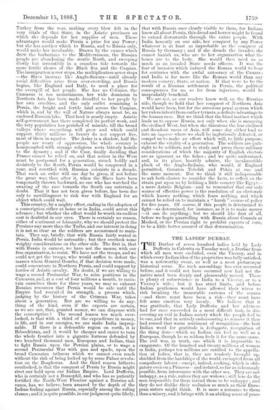RUSSIA AND PERSIA.
THERE is no proof whatever that the Czar, who in matters of foreign policy is " Russia," has decided to attack Persia, or to exercise upon its Court a diplomatic pressure of the kind which would attract immediate atten- tion throughout Europe. Nevertheless, the sudden out- burst of temper in the Russian journals caused by the Anglo-Persian Treaty opening the River Karun to the trade of all nations deserves to be carefully remembered. That outburst must have been permitted by the Russian Foreign Office; and if it were not, but only expresses the spontaneous feeling of the cultivated class in St. Peters- burg and Moscow, it is all the more important. It shows that either the Russian Government, or the Russian political class, look upon Persia as a future heritage, and are indignant at any transaction which may interfere with their reversionary claim. There is nothing whatever in the " triumph " achieved by Sir Drummond Wolff'.s adroitness and energy to irritate any Power,—nothing, indeed, which, but for the display of Russian spleen, would. not have escaped notice. The acute traders of Bombay can henceforward, run their steamers past Mohumrah, on the Persian Gulf, for a hundred miles or so, into the interior of Southern Persia, and sweep up what little produce there may be for sale, and the few pilgrims who wish to go to Mecca. That is all ; and all there is, is opened as freely to the whole world as to the Parsees and Jews who profit most by the situation of Bombay. The matter is of no importance except to a few traders, and but for political considerations, would probably never have been heard of by any living Russian. Those considerations, however, fully justify- Russian interest in any evidence of English activity in Persia, for they are these.
The conquest of Persia is, and must always remain, the alternative policy of the Russian Government. The country, which, if we include its desert tracts, is three times as large as France, if filled with people and decently governed, would be one of the most valuable possessions to be obtained in Asia. It will grow anything, for it covers all climates, from the chilly yet fertile districts on the Caspian, to the sultry plains without trees or water which once supported. the magnificence of Babylon, and which, if irrigated from the great rivers, would again become the richest gardens in the world. With ten millions of Russians in it—and there is room for thirty—the country would produce a surplus revenue of as many pounds, and terminate one of the greatest difficulties of the Czars, the impossibility of making their tremendous dominion in Northern Asia pay. You cannot get taxes out of a. steppe. Moreover, the owners of Persia; if they were Kuropeans, could be, and almost of necessity would he, the most dangerous enemies of the Sultans of Turkey; could confer upon Armenia a dependent freedom, and so secure to themselves the loyalty of the best of Asiatic agents, agents whose fidelity is assisted by their creed ; and then. attack Turkey from the rear, making every blow felt in the very vitals of that State, in the Asiatic provinces on which she depends for her supplies of men. These advantages would make Persia a prize for any Power ; but she has another which to Russia, and to Russia only, would make her invaluable. Drawn by the causes which drew the barbarians to the Mediterranean, the Russian people are abandoning the sterile North, and sweeping slowly but irresistibly in a ceaseless tide towards the more fertile shores of the Black Sea and the Caspian. The immigration never stops, the multiplication never stops —the Slays increase like Anglo-Saxons—until already social difficulties arise from over-crowding, and Russia begins, like England and Italy, to need a place for the overspill of her people. She has no Colonies, the Caucasus is too mountainous, her wide dominion in Northern Asia has been made dreadful to her people by her own cruelties, and the only outlet remaining is Persia, the bright and fertile land across the Caspian, which is, and by the will of Nature always must be, an enclosed Russian lake. That land is nearly empty. Asiatic self-government has there completed its perfect work, and the very population has perished of misrule, till the broad valleys where everything will grow and which could support. thirty millions in luxury do not support five, most of them in squalor. The Army is a shadow, half the people are weary of oppression, the whole country is honeycombed with strange religious sects bitterly hostile to the dynasty ; and if the Czar, finally deciding that France cannot be relied on, and that action in the West must be postponed for a generation, struck boldly and decisively to the South, Persia would be conquered in a year, and resettled with Russian colonists in a decade. That such an, order will one day be given, if not before the great war, then after it, when the Slays have been temporarily thrown backward, no one who has watched the swaying of the race towards the South can entertain a doubt. That it has not been given before, has been due only to unwillingness to risk war with England for an object which could wait.
' This country, by a mighty effort, ending in the adoption of a conscription either at home or in India, could arrest this advance ; but whether the effort would be worth its endless cost is doubtful in our eyes. There is certainly no reason, either of sentiment or humanity, why we should protect the Persians any more than the Turks, and our interest in doing it is not so clear as the soldiers are accustomed to main- tain. They say, briefly, that with Russia fairly seated in Persia, India would be untenable ; but they overlook some weighty considerations on the other side. The first is, that with Russia in earnest, we have not the means, with our free organisation, to resist. We have not the troops, and we could not get the troops, who would suffice to defeat the masses whom General Gourko, if that decision were made, could concentrate in Northern Persia, and could support by hordes of Asiatic cavalry. No doubt, if we are willing to wage a second Peninsular War, to seize positions in the Caucasus, and, at a cost of four millions a month, to main- tain ourselves there for three years, we may so exhaust Russian resources that Persia would be safe until the Empire had recruited its strength, a process which, judging by the history of the Crimean War, takes about a generation. But are we willing to do any- thing of the kind, even if the experts are certain, as we are not, that, granted money, we can dispense with the conscription ? The second reason too much over- looked, is that with a third of the expenditure in money, in life, and in our energies, we can make India impreg- nable. If there is a defensible region on earth, it is Beloochistan, and it would be cheaper and easier to turn the whole frontier into a gigantic fortress defended by two hundred thousand men, European and Indian, than to fight Russia upon the Persian plains, or to wage a second Peninsular War with gun and spade, upon the broad Caucasian isthmus which we cannot even reach without the risk of being locked up by some Palace revolu- tion on the Bosphorus. And the third reason hitherto overlooked, is that the conquest of Persia by Russia might rivet our hold upon our Indian Empire. Lord Dufferin, who is certainly not a Russophil, and who has so patiently fortified the North-West Frontier against a Russian ad- vance, has, we believe, been amazed by the depth of the Indian feeling against Russia, especially among the ruling classes ; and it is quite possible, in our judgment quite likely, that with Russia once clearly visible to them, for Indians know all about Persia, this dread and horror might be found to extend downwards through the entire people. With India honestly on our side, her conquest by any Power whatever is at least as improbable as the conquest of Russia by Germany ; and if she dreads the invader, she cannot banish us, who are to her organisation what the bones are to the body. She would then need us as much as an invaded State needs officers. It was the fear of invasion which induced the Roman world to bear for centuries with the awful autocracy of the Caesars ; and India is far more like the Roman world than any modern country, State, or nation. If that were to be the result of a Russian settlement in Persia, the political consequences for us, so far from injurious, would be unspeakably beneficial. We are not, as our readers know well, on the Russian side, though we hold that her conquest of Northern Asia would have been, but for the atrocious penal system which her rulers inherit from earlier tyrants, a definite advantage to the human race. But we think that the blind instinct which leads us to oppose Russia, not only when she is menacing the civilised West. but when she threatens the less civilised and decadent races of Asia, will some day either lead us into an impasse where we shall be ingloriously defeated, or compel us to make an effort which will, to little purpose, exhaust the vitality of a generation. The soldiers are quite right to be soldiers, and to study and press those military considerations of which the majority of English electors- are as ignorant as the fishes ; and we quite understand, and, in its place, heartily admire, the inexhaustible pluck of the Anglo-Indians, who would, if England permitted, threaten Tobolsk and Pekin at one and the same moment. But we think it still indispensable to ask both classes to consider the facts, to reflect on the strain put upon us by holding a little country like Egypt— a mere Asiatic Belgium—and to remember that our only source of effective power is the resolution of an electorate which knows nothing, which fears nothing, and which cannot be relied on to maintain a " harsh " course of policy for five years. Of course, if this people is determined to fight—as determined, for instance, as it is to make money —it can do anything ; but we should like first of all, before we begin quarrelling with Russia about Consuls at Meshed, or the Persian right to prohibit exports of corn, to be a little better assured of that determination.















































 Previous page
Previous page